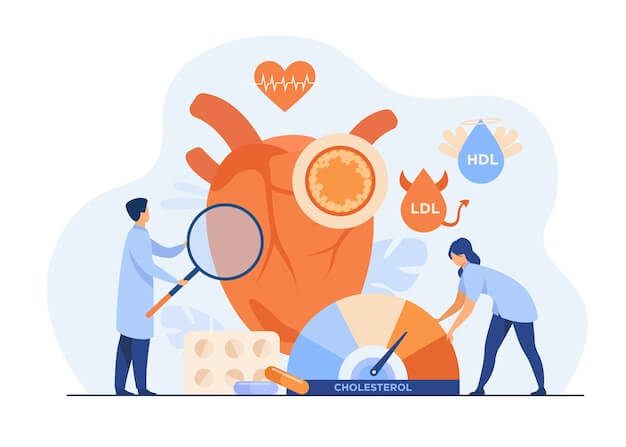Relevant surveys show that the risk of heart attack will increase by 7% for every 10 ℃ drop in temperature. Experts pointed out that in cold weather, the human body should first ensure the blood supply of important organs such as the brain, heart, lung and liver, and the contraction of peripheral blood vessels such as skin. The increase of blood pressure and heart rate will increase the burden on the heart, which will easily lead to heart disease.
The weather is cold, so people don't pay much attention to ventilation. Experts said that the windows were closed in autumn and winter, harmful gases in the room were not effectively discharged, and fresh air could not flow into the room, which could easily lead to the symptoms of heart disease and even more serious problems, such as sudden cardiac death.
Seek medical advice immediately in case of sudden chest pain
The causes of chest pain are very complex. Experts emphasized that patients with sudden chest pain should be most alert to life-threatening diseases, especially fatal chest pain, including acute coronary syndrome, aortic dissection, pulmonary embolism, tension pneumothorax, etc. The possible symptoms include angina pectoris, severe persistent chest pain, dyspnea, irritability, sweating, etc. Do not delay in case of sudden chest pain, and go to the hospital immediately. At this time, do not drive or take a private car, nor do you want to be far away. You'd better call 120 and use an ambulance to send it to the nearest hospital.
If it is clear that it is "acute myocardial infarction", we should not hesitate to go to the nearest hospital with rescue ability to receive thrombolytic or acute cardiac intervention surgery, and we must see the emergency department, so as not to waste valuable time waiting in the outpatient department. 120 minutes after the onset of acute myocardial infarction is the "golden time" for treatment. Time is the heart and time is life.

Watch out for signs
If the following symptoms occur, we should be alert to the heart problem and go to the hospital for inspection and treatment in time.
- Lack of energy. Patients with heart disease are prone to fatigue, because the heart blood ejects less, and the blood supply is not good. Sometimes, pulmonary congestion and lack of oxygen can also cause fatigue, especially those with strong activity ability at ordinary times obviously feel that fatigue may cause heart disease.
- Short of breath. It is easy to be short of breath after activities, and the air is insufficient; Some people have obvious myocardial ischemia, or feel chest tightness after heart failure.
- Pain. The common angina pectoris is that the heart pain is not too short or too long. The very short ones are not heart disease, but often neuralgia. The acupuncture like ones are gone. The heart pain is usually more than 3-5 minutes long. Of course, there are also long and short ones. If the pain is severe, more than 30 minutes, it may be a heart attack. You should go to the hospital immediately.
- Dizziness, palpitation and palpitation caused by hypertension, arrhythmia and heart failure. If these symptoms occur, we should be alert to the occurrence of heart disease complications.
Check if there are symptoms
To prevent heart disease, different ways and combinations should be adopted according to different situations. It is reasonable that different people should give different prevention methods instead of emphasizing a certain method. There is no single method that can solve all problems. Only in this way can we make a correct diagnosis, achieve the goal of precise treatment, and avoid the attack of heart disease and accidents caused by heart disease.
For example, the "three high" people should control and treat the original diseases and prevent heart disease; People who don't like to move at ordinary times should exercise appropriately; Some people are too introverted and paranoid, so they should do psychological counseling, integrate more into society, communicate more with people, and avoid heart disease caused by mental factors; Long term alcoholics should give up drinking and avoid alcoholic cardiomyopathy; Those who like to eat fat should control their weight and eat healthily to prevent heart disease.
In the early stage of heart disease, prevention should be strengthened and treatment should be carried out when necessary. In clinical work, doctors sometimes encounter patients with multiple coronary heart disease predisposing factors such as hyperglycemia, hypertension, diabetes, panic, chest tightness, and need to do corresponding examinations such as cardiac ultrasound, coronary artery, CTA, etc. The doctor suggests that, for those with symptoms, the doctor should ask you to have a check, which is very important. Modern medicine is the result of many years of medical development with the aid of instrument inspection, which can confirm whether the doctor's judgment is accurate or not, and the diagnosis is not clear if not done. According to the examination results, if the cardiovascular system is blocked, stents need to be placed, otherwise there is a life risk of myocardial infarction. Not all heart diseases need to take medicine. For example, some heart diseases with conduction disorder need a pacemaker. There are also times when there is no heart disease and no need to take medicine. Once you take medicine, you feel that you have heart disease, which is easy to cause emotional anxiety.
Good mood, everything is good
Experts remind that mental pressure can lead to myocardial ischemia in patients with stable coronary heart disease, that is, myocardial ischemia induced by mental pressure. Many patients who repeatedly complain of palpitations have anxiety symptoms.
So, why are emotions closely related to heart disease? Experts explained that when people are depressed or angry, they are not easy to follow normal diet and exercise, and even smoke and drink heavily, which is self-evident harm to the heart. The human body will produce stress reaction when the mental pressure is too high, and the body will release catecholamine and adrenaline, which will lead to the increase of blood pressure and blood sugar, and also cause cardiovascular contraction, myocardial ischemia, causing serious harm to the heart.
Experts said frankly that when patients with heart disease have psychological disorders such as anxiety or depression, most of them will not go to see a psychiatrist, but only go to the cardiology department for medical treatment due to chest tightness, chest pain, palpitations, shortness of breath and other physical symptoms. At the same time, some patients who went to the cardiology department did not suffer from organic heart disease, and there was no obvious abnormality in various physiological indicators. The "symptoms" similar to heart disease attacks were actually caused by psychological disorders such as anxiety and fear.
